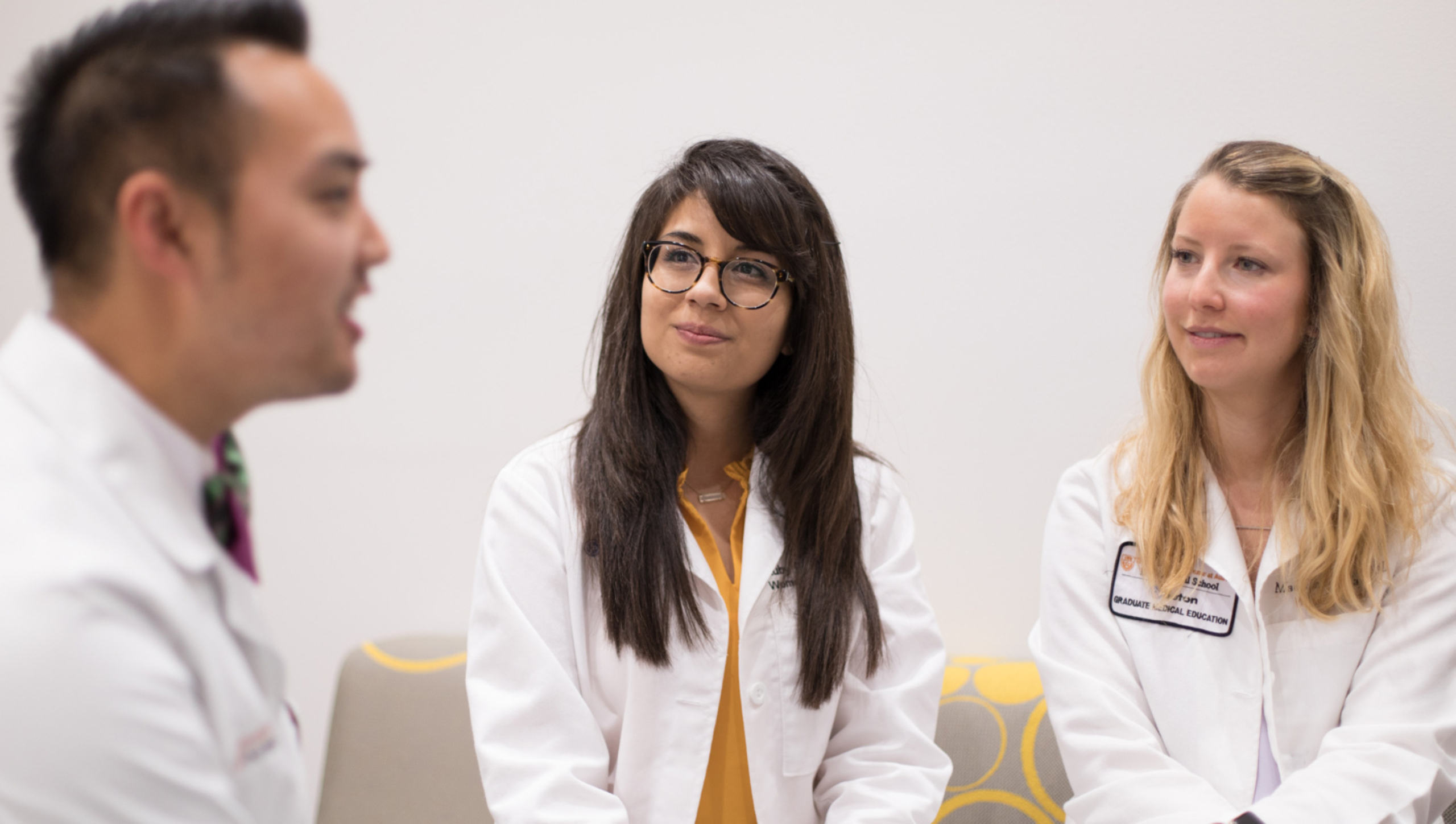From its start, Dell Med has evolved traditional methods of medical education. Through its Leading EDGE curriculum for medical students and Advancing Care Transformation curriculum for residents and fellows, Dell Med faculty and trainees are ushering in a new era of academic medicine to bring Austin’s patient population research breakthroughs, advancements in care, and the best and brightest physicians.

Each year, Dell Med faculty and trainees are evaluated by the medical students, residents and fellows they educate in the clinical learning environment. In 2023, 12 residents and 136 faculty received perfect or near-perfect scores when graded on patient experience and establishing a positive learning environment.
“Our students and trainees come to Austin to learn and train with some of the brightest minds in medicine today,” says Beth Nelson, M.D., interim vice dean of medical education. “Developing physicians who are prepared to lead us into the future of health care requires not only being a leader in one’s field — it also takes a great deal of patience, forethought and compassion to teach others effectively.”
Deonna Reese-White, M.D., and Eric Crowell, M.D., MPH, are two of the Dell Med physicians honored for their clinical teaching excellence and impact on the next generation of physician leaders.
Then, Dell Med Student. Now, Dell Med Resident & Teacher.
Residents and fellows are in the unique position of acting as learners and teachers simultaneously. While they aid in educating medical students and trainees junior to them, they also learn from the attending physicians who supervise them.
“I balance being both a learner and teacher by being up front with learners that we are in this together and there will be answers I don’t have,” says Deonna Reese-White, M.D., a third-year neurology resident who was honored with a score of 4.94 out of 5 from medical students and junior residents. “It creates an environment that is collaborative and open for any and all questions or discussions.”
Reese-White’s experience as a teacher began long before her pursuit of medicine. Prior to medical school, she was a high school science teacher and administrator at a health magnet school, where she built a curriculum using evidence-based methods and a project-based approach to increase her students’ comprehension of learning material.
It was Dell Med’s similar approach to education that attracted her here as a medical student, and now as a resident physician.
“As a medical student here, what stood out most to me were the attendings and residents who got excited about the cases we were seeing and the patient care we were providing,” Reese-White says. “It made it fun to come to work and be on a team where my teachers were excited about the work we were doing and what we were learning.”
Now as a resident, Reese-White has the responsibility of teaching the medical students she oversees, an opportunity to mirror the teaching styles that positively impacted her as a medical student, like clear learning objectives for each student. The objectives — like improving at neurological exams or understanding the most likely cause for dizziness — are identified at the beginning of each week or at the start of a new team coming together. Reese-White then checks in with the learners throughout the week to see where they are in meeting those objectives.
“An important step in equipping my students with confidence is to allow them to see my clinical decision-making process and that we don’t always know the right answer without looking to our resources and our peers for assistance,” Reese-White says. “Residency and medical school are tough, but when people feel listened to, safe to ask questions and respected, they are better able to learn, enjoy work and handle the tougher situations that arise.”
‘The Best Learning Is by Doing’
Through medical school and residency — and now as an attending physician — ophthalmologist Eric Crowell, M.D., MPH, has developed his teaching style into one rooted in tradition and tempered with patience.
“While I still use a modified Socratic method — asking trainees questions and helping guide them to the answer — I’ve found that the best learning is by doing,” says Crowell, who received a score of 5 out of 5 from residents and fellows on his teaching evaluation. “We have created an environment that allows residents to examine patients, gain exposure to various presentations of disease and observe what attendings are examining to learn more about specific exam findings. This lets residents learn at their own pace and gain confidence in their exam abilities.”
It was Crowell’s own experience as a medical student that has largely informed his approach to medical education. And as Dell Med grows and continues to educate the next generation of physicians, Crowell emphasizes the importance of patience for teachers.
“I remember some trainees being berated or severely lectured in front of other trainees — I vowed never to do this to learners,” Crowell says. “My teachers employed a similar method to what I use, and it served me extremely well in learning to care for patients. As teachers, we all know we could do it faster than a learner, but we have to let them have space and time to struggle and improve themselves. And for learners: Be patient with yourself, too. Medicine is hard. You’ll get there, but know that this is a marathon and not a sprint.”